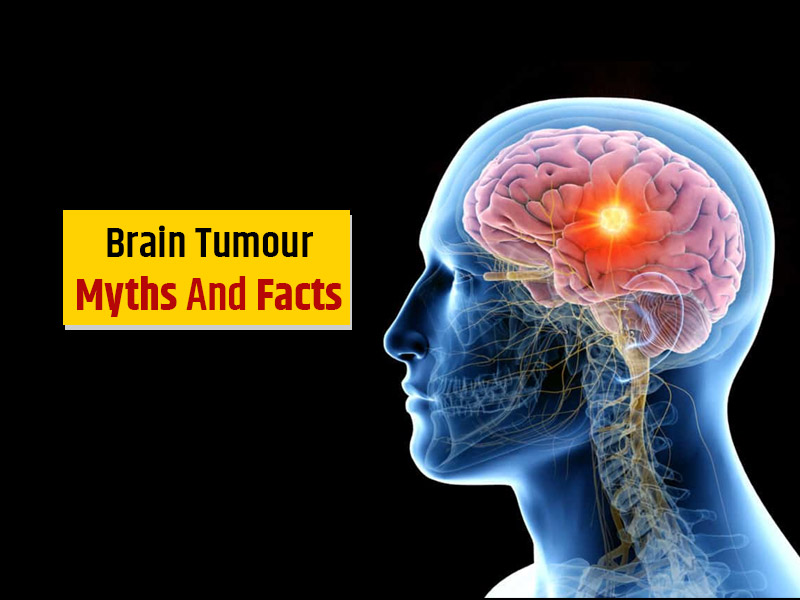
A brain tumour develops in the cells of the brain, is basically a growth, collection or mass of abnormal cells in the brain. These tumors can occur at any age or any part of the brain and its symptoms may differ from individual to individual depending upon its size, type or location. Not all brain tumours are cancerous and they can be non-cancerous too. The location of the tumor determines its impact on the central nervous system along with their symptoms and growth rate.
Table of Content:-
Dr Ravi Suman Reddy, Consultant Neuro & Spine Surgeon, Yashoda Hospitals, Hyderabad tells us more about brain tumour and also myths and facts that people must know about this disease.
How Can Brain Tumours Affect Us
When benign or malignant tumors grow, they can cause the pressure inside your skull to increase which can lead to brain damage and can be life-threatening.
Brain tumor treatment options depend on the type of brain tumor one has along with its size and location.
Also Read: World Brain Tumour Day 2019: Tell Tale Signs & Treatment of Brain Tumour
Common Symptoms of Brain Tumour
Early diagnosis and timely treatment is the key when it comes to brain tumour.
Here Are Some Common Symptoms Of Brain Tumour:
- Headaches
- Blurred vision or double vision
- Seizures
- Behavioral changes
- Clumsiness
- Nausea and vomiting
- Weakness
Brain Tumour: Myths And Facts
There are many myths around brain tumours considering its many complexities and complications. The patients must get themselves examined thoroughly and not believe in myths like mobile phones cause cancer or that it runs in the family blindly.
Some myths and facts surrounding brain tumor are as follows:
MYTH 1: If There Is A Tumour In The Brain, It Is Bound To Be Brain Cancer
FACT: Brain tumours can be of two types--benign, which is non-cancerous and malignant, which is cancerous. Certain brain tumours can damage brain cells and affect surrounding tissues and are cancerous, the rest can be treated.
Also Read: Brain Tumor in Adults: What Are The Causes And Risk Factors Related To It?
MYTH 2: All Brain Tumour Patients Have The Same Signs And Symptoms
FACT: Every patient diagnosed with a brain tumour will experience diverse symptoms. Even though there are a lot of common symptoms, not all patients exhibit the same symptoms. The signs and symptoms of a brain tumour entirely depend on the type, size and location of the tumor in the brain. Some individuals can have symptoms that may be quite evident enough and worsen with time while the rest may not have any symptom indicating a tumour.
MYTH 3: Only Adults Get Brain Tumour
FACT: These brain tumours can occur at any age. Newborns have also been found with a brain tumor. The age of a person cannot determine the risk of developing a brain tumor.

MYTH 4: Mobile Phones Can Lead To Brain Tumour
FACT: There is no recent research or proof to suggest that usage of mobile phones can lead to a brain tumour, but prolonged exposure to any radiation can have overall health effects and should be avoided.
MYTH 5: Headaches And Blurred Vision Means You Have A Brain Tumour
FACT: Majority of the time, headaches and blurred vision can be due to exhaustion, weakness or tiredness. It is not necessary that a person with a headache and blurred vision has a tumour. A headache has various causes and needs a detailed evaluation.
MYTH 6: A Brain Tumour Runs In The Family
FACT: It is not necessary that people who have family members with brain tumours are likely to get affected. There is no research suggesting that it runs in the family.
MYTH 7: If Treated, Brain Tumours Are Not Recurrent
FACT: When a person has a brain tumour and gets the treatment for its removal, then it should be followed by a routine check-up and follow ups. Although benign tumors occur rarely and can be removed surgically, still a thorough follow up is advised. Tumors can be recurrent if proper care is not taken after treatment.
Read More Articles On Other Diseases
Also watch this video
How we keep this article up to date:
We work with experts and keep a close eye on the latest in health and wellness. Whenever there is a new research or helpful information, we update our articles with accurate and useful advice.
Current Version

